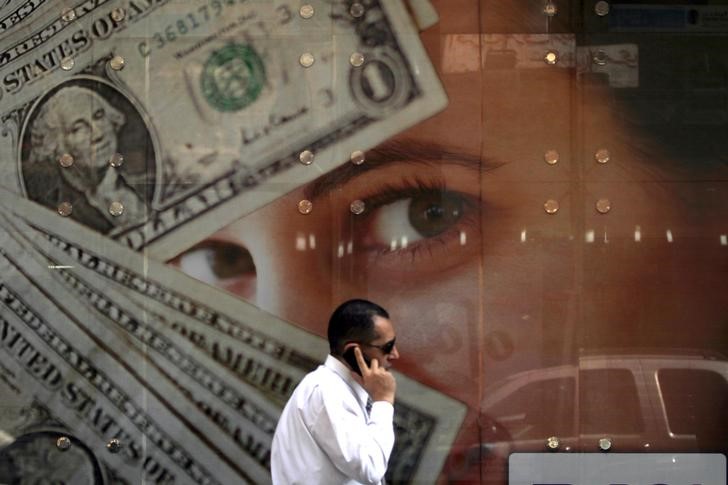Por Walter Bianchi
BUENOS AIRES, May 10 (Reuters) - Argentina's central bank this month has renewed its buying of dollars in the local foreign exchange market, checking the rise of the country's peso currency ARSB= .
While the bank has not said what its currency target is, the widespread perception in the market is that it wants to curtail its strengthening, which has been 2.1 percent so far this year.
A strong peso currency makes Argentina's exports less competitive, undercutting a government goal of boosting sales of the country's goods abroad to help lift the economy out of a recession.
The bank so far this month has bought $500 million on the spot market after purchasing none in April and $600 million in all of March, according to the central bank. That helped take the peso to 15.54 per dollar on Wednesday, a bit weaker than 15.35 pesos on May 2.
Nomura Securities this week said the interventions would likely seek to set a floor so the peso does not strengthen beyond 15.20 per dollar.
"The heightened (foreign exchange) intervention may provide a floor of resistance; however we continue to expect real (peso) appreciation through 2Q17," Siobhan Morden, head of Latin America fixed income strategy, wrote in a report. A real foreign exchange rate factors in inflation.
Argentina is expected to have inflation of 21.0 percent this year, a central bank poll of economists showed earlier this month, well above the 17 percent ceiling of the bank's target range. The government says consumer prices rose 40.9 percent in 2016. ease inflationary pressures, the central bank seeks to soak up pesos by offering high interest rates on its securities, including a 24.25 percent rate on its short-term Lebacs.
But analysts say this policy runs counter to the perceived central bank aim to curtail peso currency strength.
"It remains to be seen how effective this new (dollar-buying) measure is to curb the peso's appreciation," said Gustavo Ber, an economist at Estudio Ber, citing the appeal of high-yielding domestic bonds to foreign investors.
Domestic bond buying by foreigners has the effect of dollars chasing pesos, which tends to strengthen the Argentine currency.
A prevalent market view is that a weakening of the peso would spur grain exports since farmers would reap more pesos for their shipments abroad.
"Some farmers are waiting for the dollar to increase in value (against the peso) before selling," said David Hughes, a farmer serving as president of Argentina's Argentrigo wheat industry chamber.
For the short term, the central bank has not laid out dollar-buying plans, but its medium-term goal is to purchase more hard currency.
Last month, the president of the central bank, Federico Sturzenegger, said the bank sought to boost international reserves to 15 percent of gross domestic product, up from 10 percent currently, as the country eyes an investment grade credit rating.
